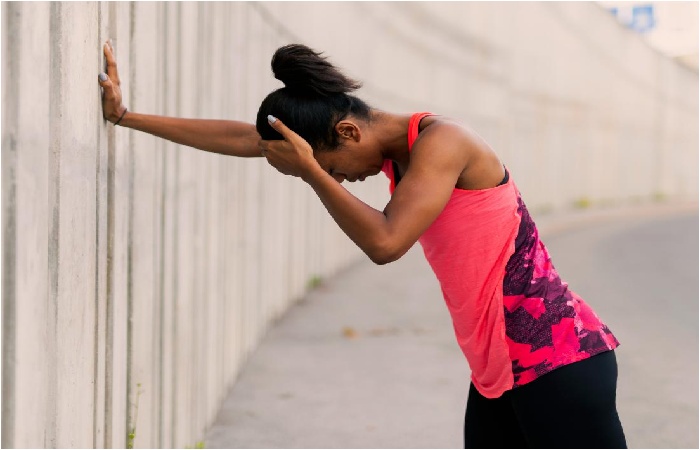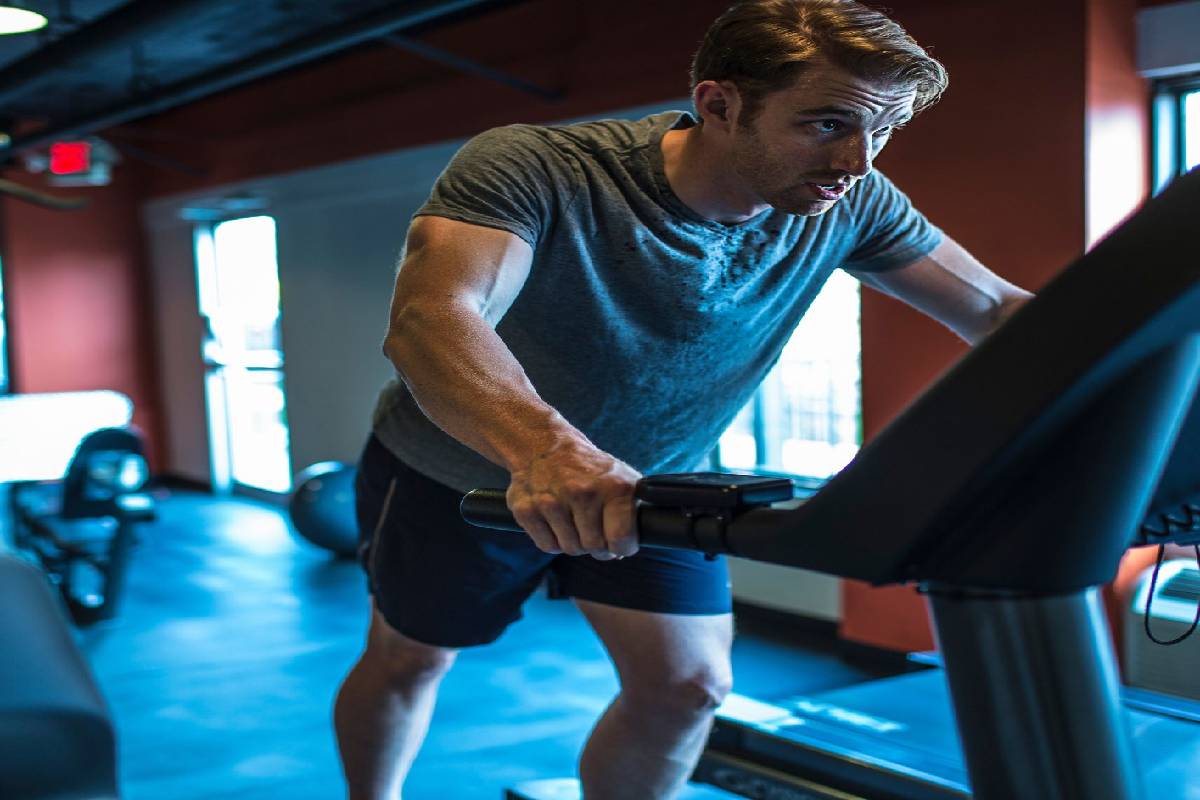Table of Contents
Introduction
Feeling dizzy(dizziness) after a workout happens very often. It is often the result of something minor, such as B. mild dehydration. In other cases, however, this may indicate an underlying condition that needs treatment. This article lists seven possible causes of post-exercise dizziness and describes treatments and prevention methods.
Also Read: What happens when you stop eating sugar completely?
Causes of dizziness

Possible reasons for dizziness after exercise include:
Excessive effort
Nonsensical exertion can make a singular feel stirred up right after working out.
Overexertion happens when people overexert themselves during real work. Signs of overexertion are:
- Dizziness
- to feel weak
- Drowsiness
- Nausea
- labored breathing
- thirst
- to vomit
According to investigate from 2021, overexertion wounds address 36.2 percent of all rec focus wounds.
Anyway, overexertion doesn’t just occur in rec focuses or practice classes. It can happen during any development.
Use of machines with continuous movement
- The sort of exercises a singular containers impact whether they get stirred up.
- For example, using a bended rehearsing machine or treadmill that requires relentless improvement may will undoubtedly make you woozy.
- Certain people experience befuddlement or intoxication when they quit using the machine. You can feel like you’re moving.
- This experience is called dizziness. Others experience drowsiness which is a system of illness.
Dehydration
It happens when the body loses more water than it uses. While absence of hydration is more typical in adolescents and more settled adults, it can impact people, things being what they are.
Sound adults will undoubtedly be dried out due to minor illnesses or vivacious dynamic work, especially in rankling environment.
Results of drying out include:
- Dizziness
- Dry mouth
- Extreme thirst
- Feel weak or dizzy
- Less frequent urination
- Fatigue
- Weakness
For sure, even delicate absence of hydration, in which essentially 1 to 2 percent of body weight decrease, can reason this aftereffect.
Numerous people envision that thirst is perhaps the earliest sign of drying out, but they are currently experiencing absence of hydration when someone is dry.
Lack of oxygen
- Lacking breathing during exercise infers that specific people don’t breathe in adequate oxygen to resolve the issues of their muscles.
- During exercise, your muscles utilize more oxygen than expected. Thusly, the pulse and breathing are advanced quickly to permit expanded oxygen take-up.
- People who don’t breathe in every now and again or significantly enough can experience unfortunate oxygen transport to the brain. Dazedness means that the brain needs more oxygen.
Low blood pressure
The force of the blood presses against the walls of the stockpile courses.
Sound circulatory strain for a large number individuals is under 120/80 millimeters of mercury (mm Hg). People with low heartbeat or hypotension will have an examining under 90/60 mm Hg.
Beat is by and large generally negligible not long in the wake of working out. Nevertheless, certain people could see a more startling drop.
Symptoms of hypotension include:
- Faint
- Fatigue
- Blurred vision
- Little concentration
- Nausea
Vigorous activity is more likely to cause low blood pressure, although any action can trigger it.
Certain people with hypotension have incidental effects when they stand up unreasonably fast.
It might be a justification for figure out started wooziness during pregnancy.
It’s similarly the eventual outcome of parchedness, heart issues, and the usage of explicit solutions.
Low blood sugar level
Low glucose or hypoglycemia happens when the glucose (sugar) in the blood is little.
Sugar is the body’s fundamental wellspring of energy.
Your muscles use more glucose than anticipated during exercise.
In like manner, certain people have low glucose levels during or after work out.
Symptoms of hypoglycemia include:
- Dizziness
- Anxiety
- Clumsiness
- Fatigue
- Hunger
- Irritability
- Tremble
- Sweat
People will undoubtedly have hypoglycemia when they haven’t had with the end result of eating before working out.
It will in general be a run of the mill issue for individuals who practice first thing.
Cardiac arrhythmias
A peculiar heart rhythm is an irregular heartbeat.
Arrhythmias can make the heart beat unnecessarily fast, excessively comfortable, or inconsistently.
Numerous conditions can cause arrhythmias, including coronary disease and significant strain.
Exercise can in like manner set off or break down arrhythmias, especially in people with coronary ailment.
Not all arrhythmias cause incidental effects, but when they do occur, they integrate:
- Dizziness
- Change in heartbeat
- Faint
- Drowsiness
- labored breathing
- Sweat
Whether or not incidental effects occur, it doesn’t be ensured to suggest that an individual has a difficult issue.
Regardless, if the arrhythmia drives forward, it is by and large vital for counsel a specialist.
Treatment for dizziness
Treatment for motion sickness after exercise will depend on the original cause of the problems.
In some cases, treatment is straightforward and straightforward. In other cases, it may be necessary to see a doctor for further study and medical help.

Rest and breathing
- Taking a few minutes off can help relieve dizziness.
- If dizziness occurs due to overexertion, improper breathing, or low blood pressure, people can try:
- Let cool and let rest for a few minutes
- Sit up and put your head between your knees, which will augment circulation system to the brain
- Practice significant unwinding for several minutes, trying to take in and inhale out comfortable.
- Purposely work on taking in and out reliably while working out
- If dizziness occurs while using a treadmill or other continuous moving machine, people should hold tight to the rails and slow down until it is safe to stop.
- These measures can prevent dangerous falls.
- Make an effort not to walk or driving until the jumbling fades away.
Hydration
- The treatment for drying out is to override fluids and electrolytes. By far most will ease incidental effects by drinking water or a games drink.
- Certain people could require an oral rehydration plan that contains water and electrolytes.
- People should drink a satisfactory number of fluids during the day with the objective that their pee is light yellow.
- Assuming you practice in extremely blistering or muggy climate, drink cold fluids to chill yourself.
- The body absorbs cold liquids superior to warm ones.
- To avoid absence of hydration, people should drink fluids throughout recently, during, and after work out.
- When in doubt, it is more brilliant to drink humble amounts as frequently as conceivable than to drink immense aggregates less routinely.
Serious absence of hydration requires clinical thought.
Eat something
- People can raise low blood sugar levels by eating something.
- Healthy carbohydrates are best for treating low blood sugar so that people can have a banana or some dates on hand.
- Drinking a glass of regular item squeeze can give faster assistance from hypoglycemic secondary effects.
- Regardless, it’s truly brilliant to stick to a supper or nibble that contains whole grains and protein to avoid extra drops in glucose.
Medical supplies
If symptoms persist or recur even though post-exercise measures are taken to stop the dizziness, a doctor may need to be seen.
A doctor may look for a reason for the dizziness, such as:
- Diabetes
- Heart problems, including arrhythmia
- the pregnancy
- severe dehydration
- severe hypoglycemia
May prescribe medication or medical treatments for diabetes and heart problems.
In severe dehydration or severe hypoglycemia, urgent treatment with intravenous fluids or intravenous glucose may be required.
Prevention for dizziness
Tips to reduce the risk of dizziness after exercise:
- Gradually increase the intensity of your training
- Avoid overloading the body
- Practice breathing regularly during the exercises
- Ponder Pilates or yoga, as these activities can assist people with controlling their unwinding.
- Drink a great deal of fluids beforehand, during, and after your activity.
- Lean protein snacks and eat a staggering starch an hour before your activity.
- stop smoking.
When should the doctor be consulted?
- An individual can address their PCP in case the dazedness proceeds.
- In case the dazedness proceeds, an expert should be directed.
- A doctor can investigate the problem and check for underlying conditions.
- People should see a doctor urgently if symptoms of arrhythmia occur suddenly or frequently.
- You should also urgently lookout for severe symptoms of other illnesses.
Also Read: Tips To Exercise Better And Safer

